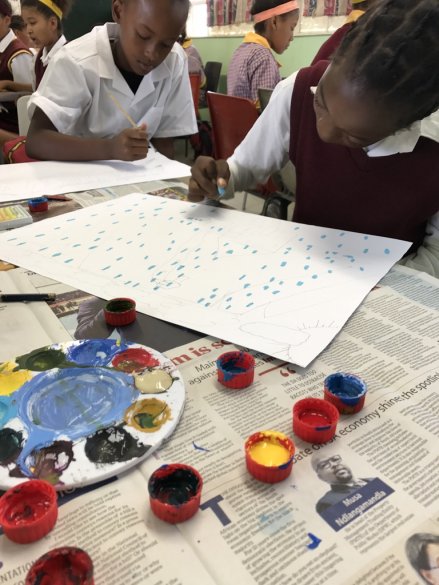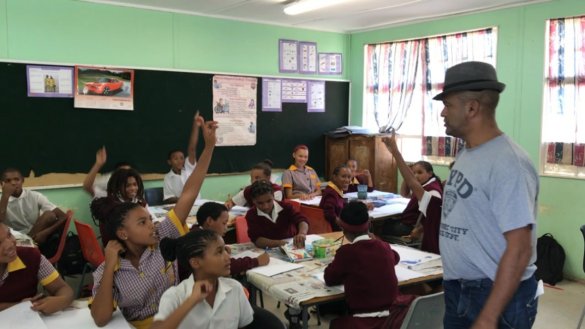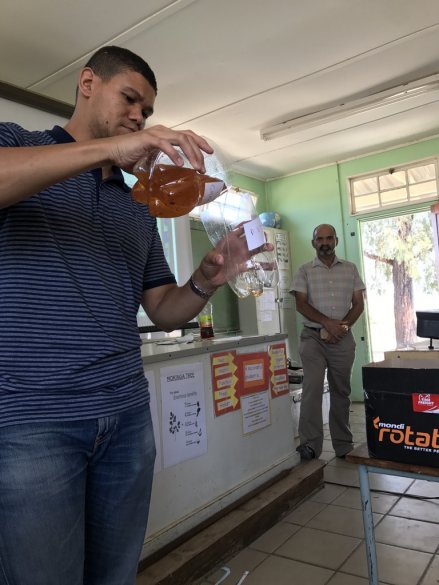DEA&DP Water Week School Programme Addresses The Importance Of Conserving Precious Water Resources.
National Water Week, held between 20 -27 March, is a campaign run by the Department of Water and Sanitation to re-iterate the value of water, the need for sustainable management of this scarce resource and the role water plays in eradicating poverty and under-development in South Africa.
During this week, the Directorate: Pollution & Chemicals Management held a series of workshops among three schools in Gouda, Saron and Mbekweni. On 22,23 & 24 March Bakerville Primary School, Saron Primary School and Langabuya Primary School were given a three-hour educational workshop related to the major water challenges facing South Africa including increasing demand and sources of pollution, the water cycle, waste water treatment and a discussion on water saving behaviour. Divided into three groups, each group was given or shown a different aspect to water as resource and precious commodity that must be conserved by each and every one of us.
The first part saw Lead SA hero, Mark Jeneker launch an art competition encouraging learners to express their view of water through art. At a young age Mark Jeneker served prison time, but later overcame a life of drug addiction to help uplift other vulnerable youth. He now works at a Mitchells Plain Primary school and library teaching young kids to express themselves through art. Cathy Bill, who helped organise the DEA&DP Water Week school programme, said: “I was told about Mark’s work through the Cape Craft and Design Institute and just knew he would help us bring a different approach to the workshop because most children love to express themselves through art. We wanted to help develop the creative talent in these underprivileged schools whilst talking about the importance of water. The learners really took to the art competition and some beautiful artworks came out of the lessons. We will adjudicate the best poster at the three schools in May, with the prize being an mp3 player. The schools can also enter the provincial competition run by the Department of Water and Sanitation and stand to win R10 000 for their school.”
The second part, was a lesson on the water cycle and the impact that urbanisation, population growth, waste and pollution, lack of sanitation and deforestation has on water as scarce resource. Learners were astonished at the population size of some major cities in the world such as India and Brazil. “The point of this lesson was to draw a parallel to South Africa and that we are not far behind this trend if we don’t address and conserve the water we have now. And that every individual can contribute to an improved living environment even in small ways e.g. by reducing the amount of throwaway packaging they use, not littering or using water efficiently”, said Bill.
The third and final lesson, was on the waste water treatment process. This included a demonstration on how Biological Treatment works in the waste water treatment process. Russell Mehl, also from the Water Week organising team, explained, “Through these workshops we also wanted to show learners the importance of water reuse and the waste water treatment process in cleaning water. Given our current drought situation, the concept of water reuse and water reclamation may become a reality in the near future.” The theme for National Water Week is “Water and Sanitation is a Human Right”, and through the DEA&DP Water Week school programme, it was instilled that this is something that can only be achieved with a collective responsibility approach.
Learners get creative with what the water cycle means to them.
Mark Jeneker, LeadSA hero, talks to the learners about the water cycle.
Demonstrating the waste water treatment process.



